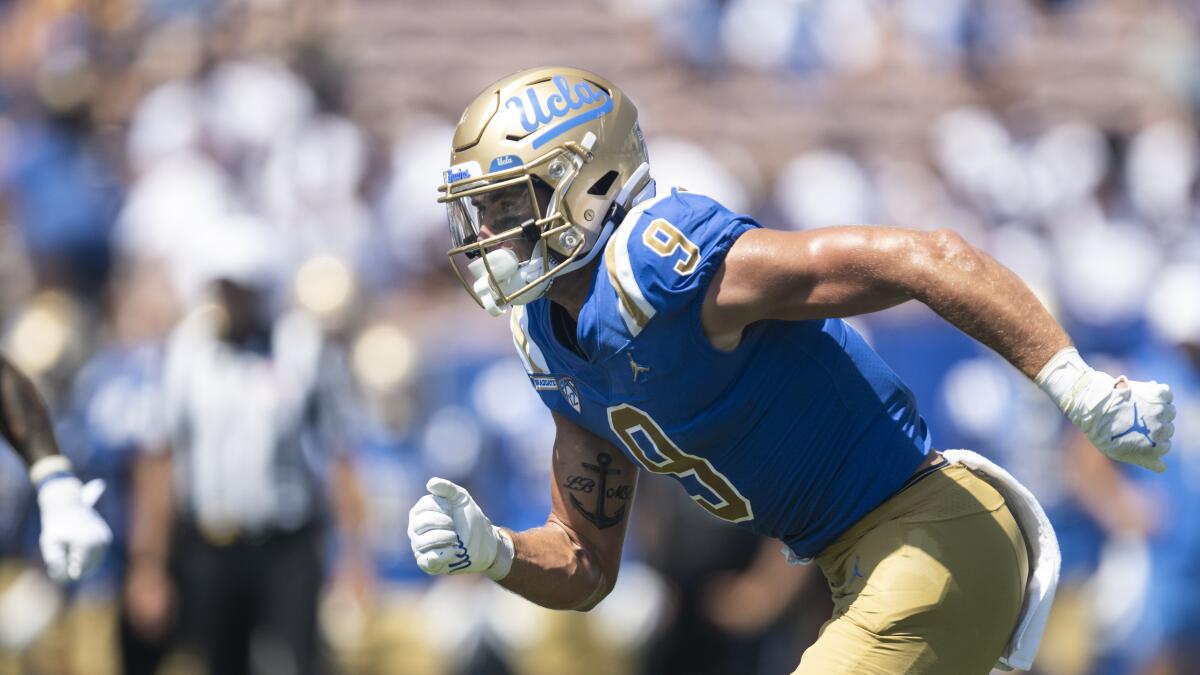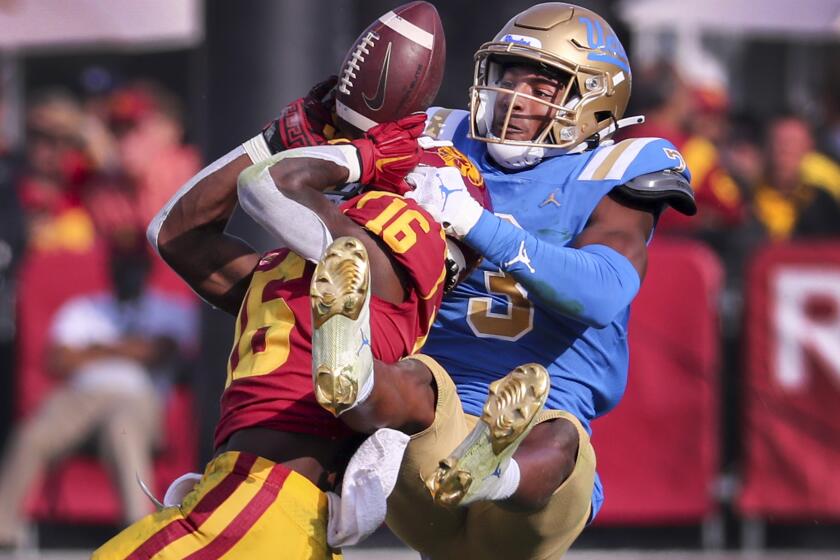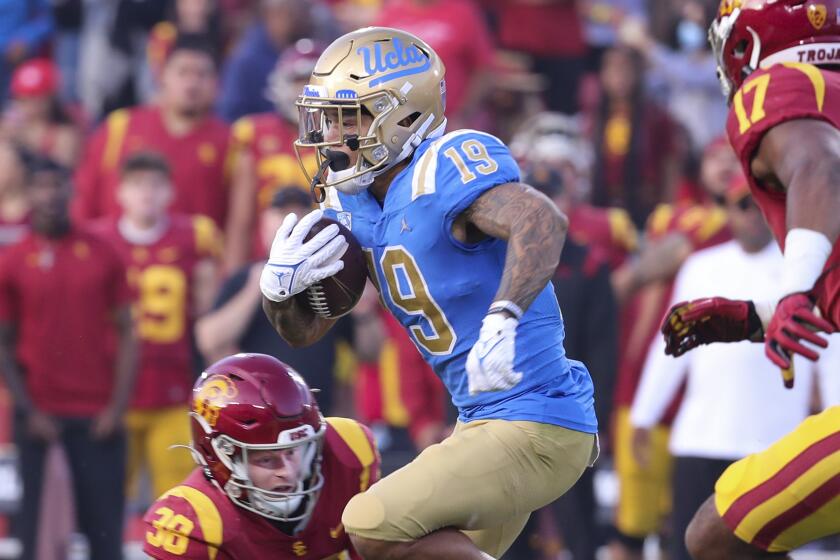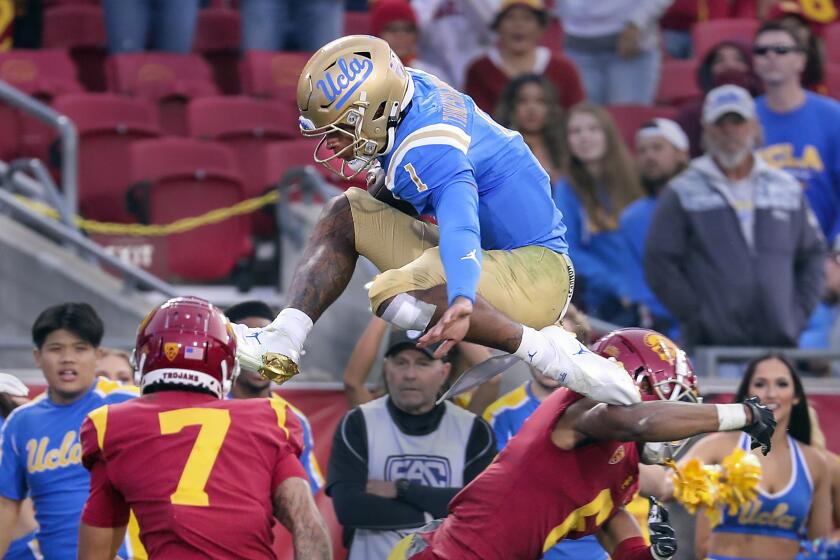UC campuses face rollback in authority after UCLA deal to leave Pac-12 irks regents

- Share via
The University of California isn’t done addressing the fallout over UCLA’s move to the Big Ten that set off a national furor and irked the powerful UC Board of Regents.
The regents, meeting in San Diego on Thursday, briefly discussed a proposal to bar the university president from delegating such authority if one UC campus’ proposed athletics transaction would cause a sister campus a “material adverse financial impact” — defined as 10% or greater of the operating revenue of the athletic department in question. The ban on delegating authority to campuses would also apply if a proposed deal would raise a “significant question” of university policy or create a “significant risk of reputational harm” to UC.
University of California system leaders proposed new rules that may limit campuses from making major athletics contract decisions on their own.
Board Chair Richard Leib emphasized that the proposal is aimed at future campus actions. But it was triggered by widespread concerns among regents about the financial impact UCLA’s decision to leave the Pac-12 in 2024 could have on UC Berkeley.
The Westwood campus will receive a full share of the new Big Ten media rights package that’s valued at more than $1 billion per season and is expected to be multiple times that of a Pac-12 deal under negotiation. But UC Berkeley is bracing for a multimillion-dollar loss in media revenue under a new TV contract with a Pac-12 conference diminished by the departure of UCLA and USC.
The board did not take action Thursday, deciding to refer the matter to the governance committee to hash out at a future meeting. Nor did regents answer the big question: whether they would try to cancel the controversial deal. Leib said he did not want to give a timeline as to when those decisions would be made because “there’s still basic information we don’t know,” declining to be more specific.
Leib told The Times in August that he and a “handful” of regents were informed of UCLA’s intent to leave the Pac-12 shortly before the decision was announced. That lack of notification on such a major issue upset many regents — including Gov. Gavin Newsom, an ex-officio board member. But UC President Michael V. Drake said Thursday that UC officials followed all policies, including one that allows the university president to delegate authority to chancellors to execute their own contracts, including intercollegiate athletic agreements.
“What we did was follow the policies that were in place at the time, and I think that’s the way that we do things,” Drake said during brief remarks after the Thursday meeting. “We’ll have a chance to review things as we go forward, but that was the decision at the time.”
Some regents said Drake must be able to come up with a plan to support Berkeley and ensure the welfare of athletes to avert the board canceling the deal.
Gov. Gavin Newsom has demanded that UCLA explain how its Pac-12 exit for the Big Ten will benefit all of its athletes and honor its relationship with UC Berkeley. Several regents have also questioned how the move would affect the health, welfare and academic performance of athletes spending more time on the road traveling to Big Ten games.
The Big Ten’s new TV agreement with Fox, CBS and NBC is worth nearly $8 billion. It will liberate USC and UCLA from after-dark kickoffs.
Pac-12 Commissioner George Kliavkoff expressed similar concerns in a letter sent to the UC regents at their request, according to a person familiar with the letter but not authorized to publicly discuss it.
Responding to the regents’ appeal for more details about the impact of UCLA’s move to the Big Ten, Kliavkoff wrote in a letter first reported by the New York Times the school’s increased revenue would be offset by higher salaries for coaches and administrators needed to remain competitive, as well as conference travel costs that would almost triple, to $23.7 million per year.
Kliavkoff also highlighted concerns about the heavier travel demands on UCLA athletes playing in a coast-to-coast conference, writing they would more than double their time spent in airplanes and increase by nearly half their time on buses, exacting a mental and physical toll while also hindering academic performance.
Kliavkoff went beyond providing numbers, however, asking the regents to intervene in blocking UCLA’s move to the Big Ten. “For the current and future generations of UCLA student-athletes,” Kliavkoff wrote, “we would strongly support a decision by the UC Board of Regents to reverse the decision made by UCLA.”
Leib said the letter “was not a game-changer because so much of the information was already out there.” But he said he was personally concerned by some of the points raised, such as the toll that greater travel would take on athletes, and wondered why tournaments for sports other than high-profile football and basketball couldn’t take place regionally.
“Why go all the way across the country to play in a stadium where no one is watching and parents can’t come?” he said. “It’s stupid.”
George Blumenthal, who served as UC Santa Cruz chancellor for 13 years until 2019, said UCLA clearly had the authority to make the deal under the rules at the time and regents delving into travel schedules of athletes appeared to be “micromanagement to the extreme.”
But he said it was a “legitimate issue” for regents to try to mitigate the harm to one UC campus by the actions of another.
The University of California will scrutinize UCLA’s Pac-12 exit and issue a public report on the impact on student-athletes and financial fallout on UC Berkeley and other campuses, following Gov. Gavin Newsom’s demands for clarity.
“UC is one system and while we want to give as much authority as possible to individual campuses, this is a prime example where a decision of one campus can adversely affect another campus,” said Blumenthal, who now heads the Center for Studies in Higher Education at UC Berkeley.
After UCLA’s departure alongside USC was announced in late June, Bruins athletic director Martin Jarmond said the move would help secure the future of a department riddled with debt while avoiding the possibility of cutting Olympic sports teams.
Some of UCLA’s new revenue could be diverted to Cal if the UC regents force UCLA to subsidize its sister school’s athletic department as a penalty for leaving the Golden Bears in a diminished Pac-12. At the UC regents meeting last month on the UCLA campus, it was estimated that the departures of the two Los Angeles schools would cost the Pac-12 roughly $13 million in lost media rights revenue annually.
Jarmond and UCLA Chancellor Gene Block said at the time their school announced its conference switch that playing in the Big Ten would come with more than financial benefits, including an expanded recruiting base and a fortified brand offering athletes additional name, image and likeness opportunities amid a rapidly changing sports landscape.
More to Read
Sign up for Essential California
The most important California stories and recommendations in your inbox every morning.
You may occasionally receive promotional content from the Los Angeles Times.


















